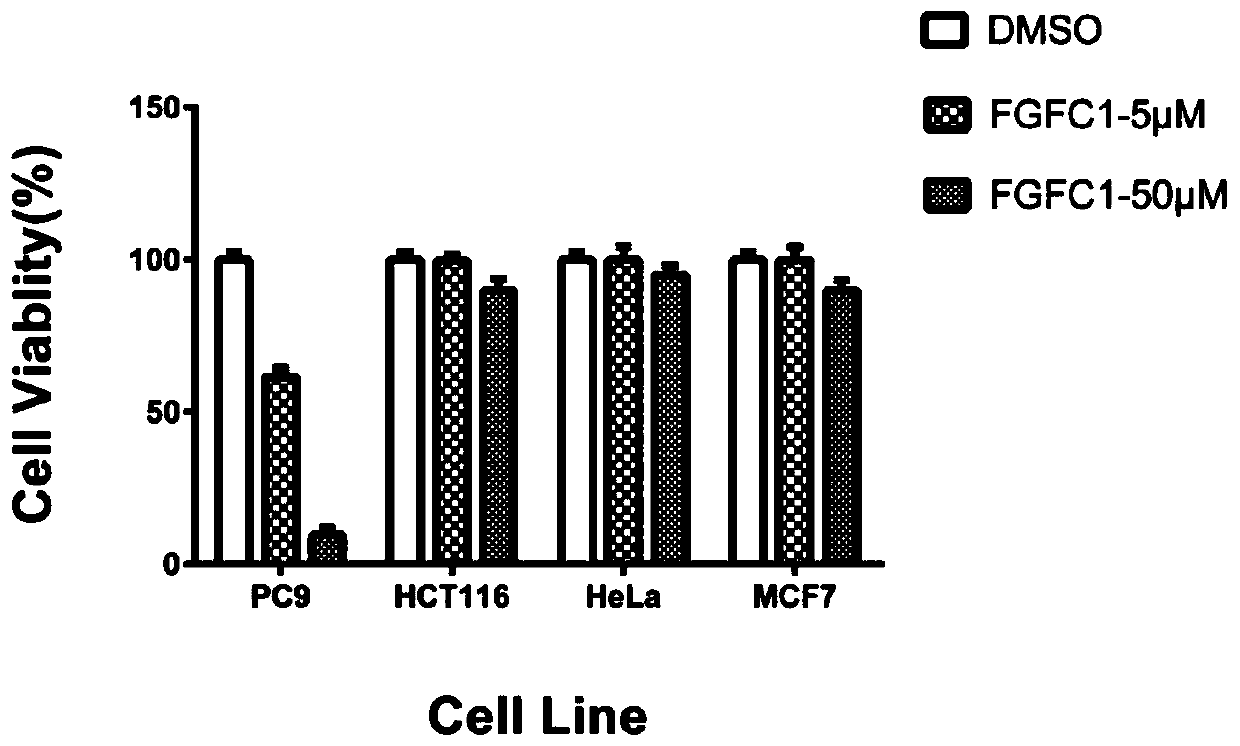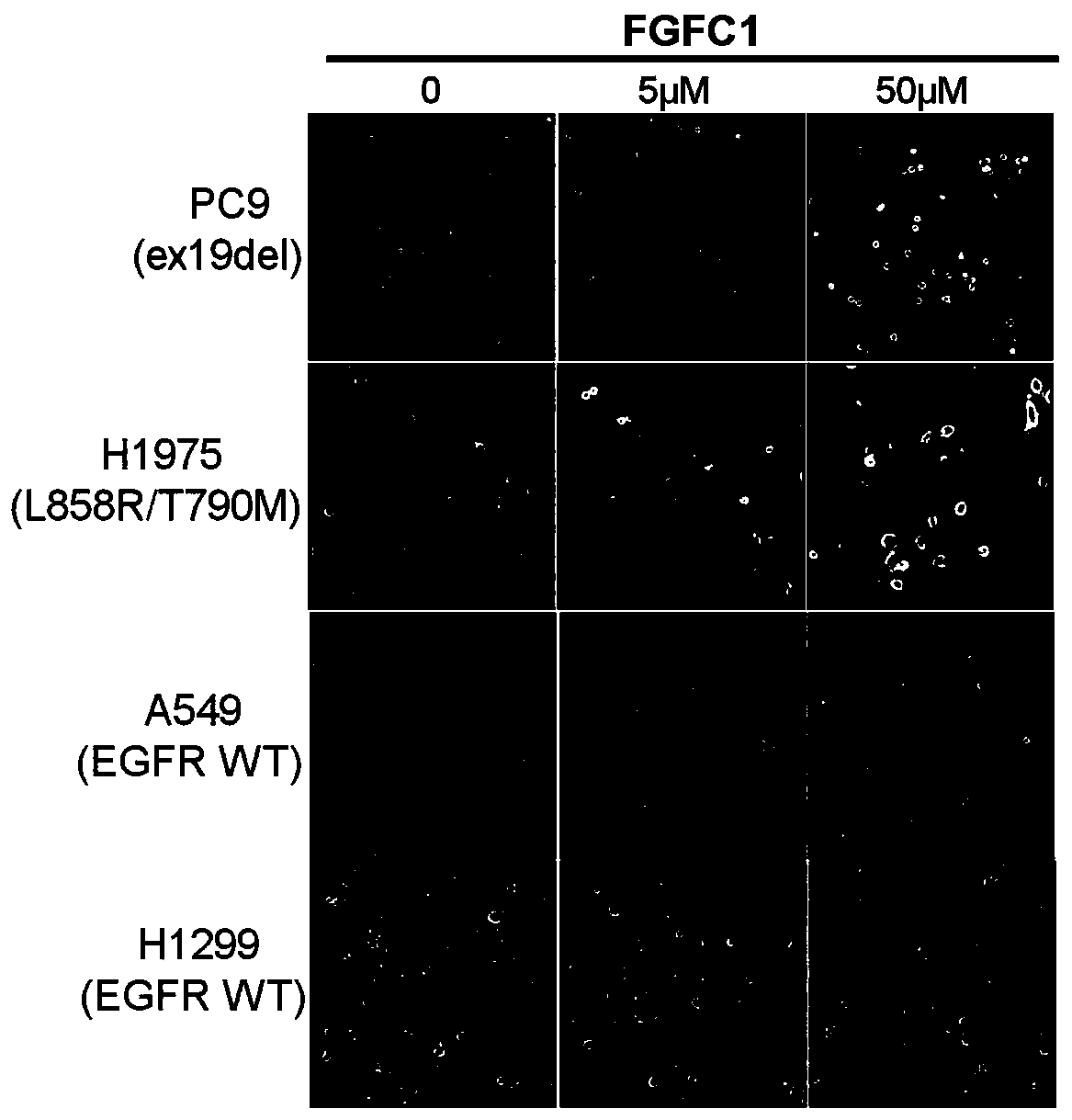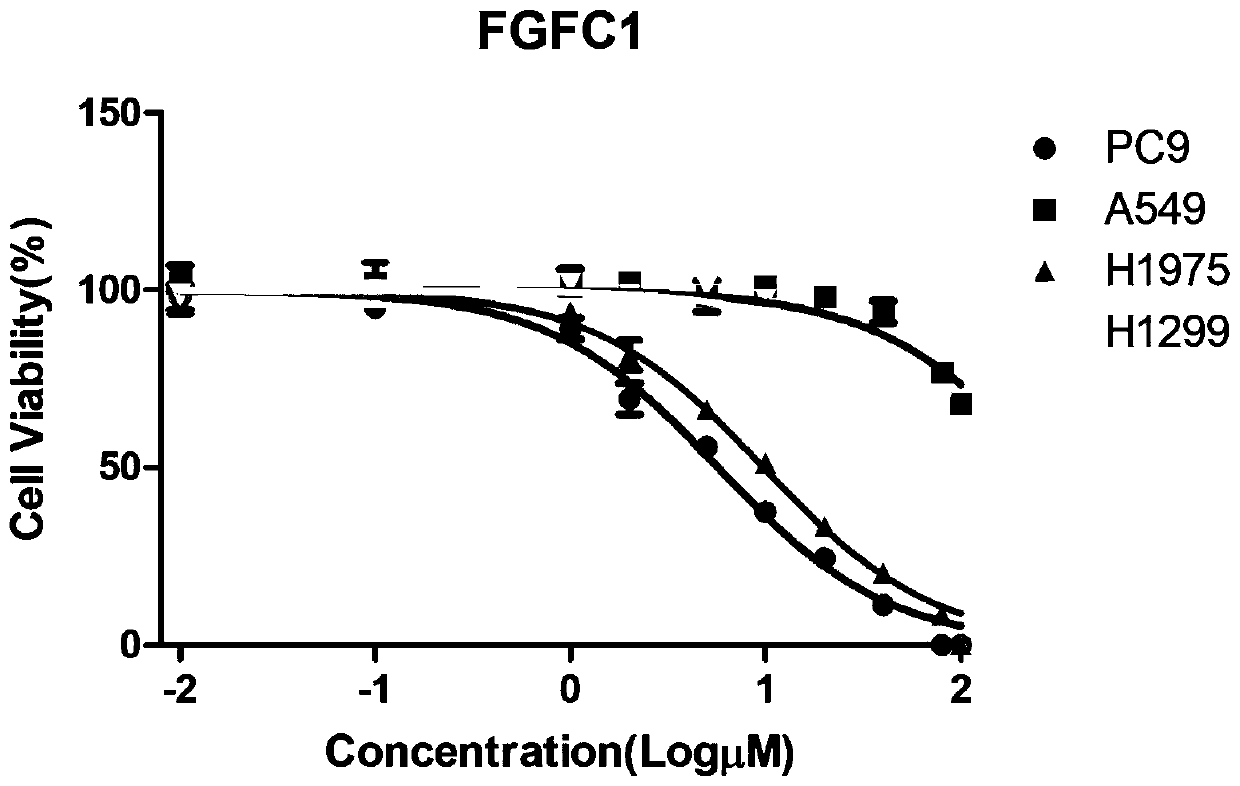Application of bis-indole compound FGFC1 in preparation of medicaments resistant to non-small cell lung cancer
A technology for non-small cell lung cancer and bisindole compound, which is applied in the application field of bisindole compound and the preparation of anti-non-small cell lung cancer drugs, and can solve the problems of limiting therapeutic efficacy and the like
- Summary
- Abstract
- Description
- Claims
- Application Information
AI Technical Summary
Problems solved by technology
Method used
Image
Examples
Embodiment 1
[0030] Inhibitory effect of FGFC1 on proliferation of cell lines of different tumor types.
[0031] (1) Cell inoculation: Four tumor cell lines (HCT116, HeLa, PC9 and MCF7) in the exponential growth phase were digested respectively, and suspensions were prepared with RPMI1640 or DMEM medium containing 10% calf serum. Tumor cells were seeded at 1×10 5 cells / mL inoculated in 96-well culture plate, add 100 μL to each well, at 37°C, CO 2 Cultivate in the incubator for 24h.
[0032] (2) Dosing: the compound to be tested was prepared into a stock solution with a certain concentration by adding DMSO, and then prepared into 5 μmol / L and 50 μmol / L solutions with RMPI1640 or DMEM medium containing 10% calf serum, and inoculated in 96 In a well-plated cell culture plate, set up three parallel wells for each concentration, at 37°C, 5% CO 2 Cultivate in the incubator for 48h. The control group was treated with DMSO, without adding drugs, and continued to culture for 48 hours. The chang...
Embodiment 2
[0036] The results of morphological changes of non-small cell lung cancer lines containing different driver genes treated with different concentrations of FGFC1 for the same time.
[0037] (1) Inoculated cells: respectively digest non-small cell lung cancer cell lines in exponential growth phase containing different driver genes: EGFR sensitive mutation PC9 (ex19del), EGFR primary resistance mutation H1975 (L858R / T790M), EGFR wild type A549 (KRAS mutation), H1299 (NRAS mutation). Suspension was made with RPMI1640 or DMEM medium containing 10% calf serum. The tumor cells were seeded with a cell number of 0.5×10 5 cells / mL inoculated in 12-well culture plate, add 2 mL to each well, at 37°C, CO 2 Cultivate in the incubator for 24h.
[0038] (2) Dosing: the compound to be tested was prepared into a stock solution with a certain concentration by adding DMSO, and then prepared into 5 μmol / L and 50 μmol / L solutions with RMPI1640 or DMEM medium containing 10% calf serum, and inoculat...
Embodiment 3
[0041] Inhibitory effect of FGFC1 on non-small cell lung cancer cell lines harboring different driver genes.
[0042] (1) Inoculated cells: respectively digest non-small cell lung cancer cell lines in exponential growth phase containing different driver genes: EGFR sensitive mutation PC9 (ex19del), EGFR primary resistance mutation H1975 (L858R / T790M), EGFR wild type A549 (KRAS mutation), H1299 (NRAS mutation). Suspension was made with RPMI1640 or DMEM medium containing 10% calf serum. Tumor cells were seeded at 1×10 5 cells / mL inoculated in 96-well culture plate, add 100 μL to each well, at 37°C, CO 2 Cultivate in the incubator for 24h.
[0043] (2) Dosing: the compound to be tested was prepared into a stock solution with a certain concentration by adding DMSO, and then prepared into 0.01, 0.1, 1, 2, 5, 10, 20 respectively with RMPI1640 or DMEM medium containing 10% calf serum , 40, 80, and 100 μmol / L solutions, inoculated in 96-well cell culture plates, and set up three p...
PUM
 Login to View More
Login to View More Abstract
Description
Claims
Application Information
 Login to View More
Login to View More - R&D
- Intellectual Property
- Life Sciences
- Materials
- Tech Scout
- Unparalleled Data Quality
- Higher Quality Content
- 60% Fewer Hallucinations
Browse by: Latest US Patents, China's latest patents, Technical Efficacy Thesaurus, Application Domain, Technology Topic, Popular Technical Reports.
© 2025 PatSnap. All rights reserved.Legal|Privacy policy|Modern Slavery Act Transparency Statement|Sitemap|About US| Contact US: help@patsnap.com



